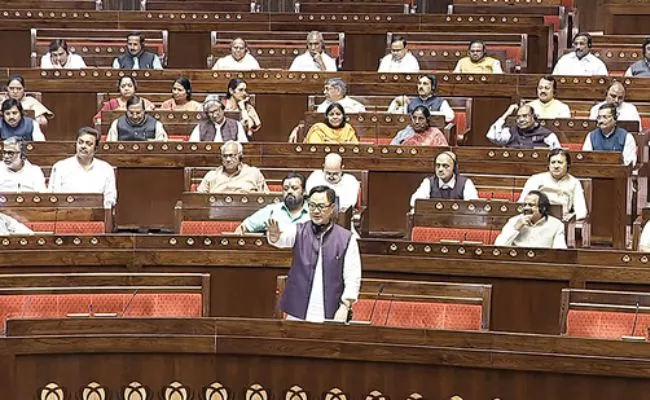.gif)
.gif)

The Waqf (Amendment) Bill has successfully cleared both the Lok Sabha and Rajya Sabha, marking a significant legislative development amid intense political debate. Just 24 hours after its approval in the Lok Sabha, the bill was passed in the Rajya Sabha with 128 votes in favor and 95 against. The bill, which aims to regulate Waqf property ownership and management, has exposed deep political divides, with the opposition alleging that it could lead to disputes over religious properties.
A major debate highlight was the Biju Janata Dal’s (BJD) decision to allow a conscience vote for its seven Rajya Sabha members. Senior BJD leader Sasmit Patra stated that the party had taken this step after considering the sentiments of different minority communities regarding the bill. This move raised speculation about its impact on the final vote count.
Defending the bill, Union Minister Kiren Rijiju emphasized that the legislation is not about religion but about property and transparency. He asserted that proof of ownership would now be required before a property is declared as Waqf, preventing automatic designations. Rijiju argued that the bill would help curb corruption and mismanagement in Waqf properties, addressing past instances where lands—including those in Lutyens' Delhi and a 400-year-old temple in Tamil Nadu—were categorized as Waqf without clear ownership records.
The opposition, led by Congress’s Syed Naseer Hussain, countered the government’s claims, arguing that the 123 properties under discussion were already recognized as mosques, dargahs, or burial grounds. He pointed out that many of these properties were granted Waqf status by the British when they developed Lutyens' Delhi. He also refuted the BJP’s claim that the existing Waqf Act prevented individuals from seeking justice in courts, citing the numerous pending cases in High Courts and the Supreme Court.
In response, Home Minister Amit Shah argued that while the earlier 2013 Waqf Act only allowed for writ jurisdiction in High Courts, it did not permit civil suits, which provide broader legal recourse. He accused Congress of misleading the public and failing to provide a proper legal framework for property disputes.
Adding to the debate, BJP President JP Nadda defended the bill, accusing the opposition of deliberately trying to derail the discussion. He noted that even Muslim-majority nations have started digitizing Waqf properties to ensure transparency, questioning why India should not adopt similar reforms. Meanwhile, Congress leader Mallikarjun Kharge urged the government to reconsider the bill, warning that it could create new disputes over religious properties.